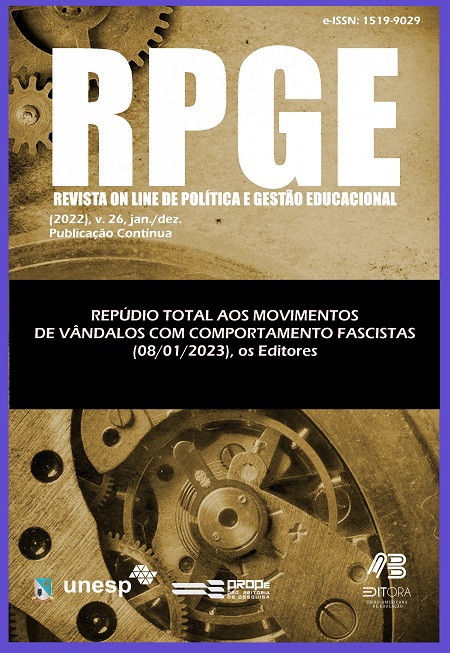Professional identity of teachers as a component of university corporate culture
DOI:
https://doi.org/10.22633/rpge.v26i00.17336Keywords:
Corporate cultureCorporate culture, Professional identity, Educational environment, Teacher, Educational organizationAbstract
The article addresses the problem of establishing the impact of educational organizations’ corporate culture on the development of professional identity in teachers and their professional advancement. The study focuses on resolving the issues of creating an educational environment that supports teachers’ potential, helps them recognize their own problems, and makes them conducive to their development by transforming the problems into objectives. It is found that the established corporate culture of educational organizations contributes to the understanding of mechanisms behind the development of new personal qualities in teachers in the process of mastering certain types of activities and, as a result, to the transformation of teachers’ fragmentary experience into sustainable motivation for professional improvement in the process of collaborative work.
Downloads
References
AUTHOR24. Organizatsionnaia kultura po F. Kharrisu i R. Moranu [Organizational Culture by P. Harris and R. Moran]. 2017. Available: https://spravochnick.ru/menedzhment/osnovnye_elementy_organizacionnoy_kultury/. Access: 10 Jan. 2022.
KOLOSOV, Y. M.; KRIVCHIKOVA, E. S. Deistvuiushchee mezhdunarodnoe pravo. T. 3 [Current International Law. Vol. 3]. Moscow: Moscow Independent Institute of International Law, 1997.
SHANE, E. Organizatsionnaia kultura i liderstvo [Organizational Culture and Leadership]. St. Petersburg: Peter Publishing, 2002.
SHNEIDER, L. B. Profeccionalnaia identichnost: Teoriia, eksperiment, trening. [Professional identity: theory, experiment, training.]. Moscow: Voronezh, 2003.
TEMRIUKOV, I. Effektivnost formirovaniia i razvitiia organizatsionnoi kultury v sisteme vnutrishkolnogo upravleniia [Effectiveness of the formation and development of organizational culture in the system of school administration]. Science and School, n. 4, p. 25-26, 2008.
WIKIPEDIA. Korporativnaia kultura [Corporate culture]. 2019. Available: https://ru.wikipedia.org/wiki/Корпоративная_культура. Access: 10 Jan. 2022.
ZUEVA, F. A. Indikativnoe upravlenie kak sredstvo formirovaniia professionalnoi identichnosti lichnosti v usloviiakh vvedeniia professionalnogo standarta pedagoga [Indicative administration as the means of molding of the professional identity of personality under the conditions of the introduction of the professional standard of the teacher]. Modern problems of science and education, n. 5, 2017. Available in: https://science-education.ru/ru/article/view?id=26851. Access in: 13 Jan. 2022.
ZUEVA, F. A. Vliianie korporativnoi kultury obrazovatelnoi organizatsii na formirovanie professionalnoi identichnosti pedagogov: monografiia. [The influence of corporate culture of an educational organization on the formation of teachers’ professional identity: monograph.]. Chelyabinsk: Publishing house of the South Ural State Humanitarian Pedagogical University, 2019.
Published
How to Cite
Issue
Section
License
Copyright (c) 2022 Revista on line de Política e Gestão Educacional

This work is licensed under a Creative Commons Attribution-NonCommercial-ShareAlike 4.0 International License.
Manuscritos aceitos e publicados são de propriedade da Revista on line de Política e Gestão Educacional. É vedada a submissão integral ou parcial do manuscrito a qualquer outro periódico. A responsabilidade do conteúdo dos artigos é exclusiva dos autores. É vedada a tradução para outro idioma sem a autorização escrita do Editor ouvida a Comissão Editorial Científica.











